Misperceived Discrimination
How accurate do persons of immigrant origin perceive discrimination?
Merlin Schaeffer & Judith Kas
2022-05-30
Perceived grievances are often puzzling
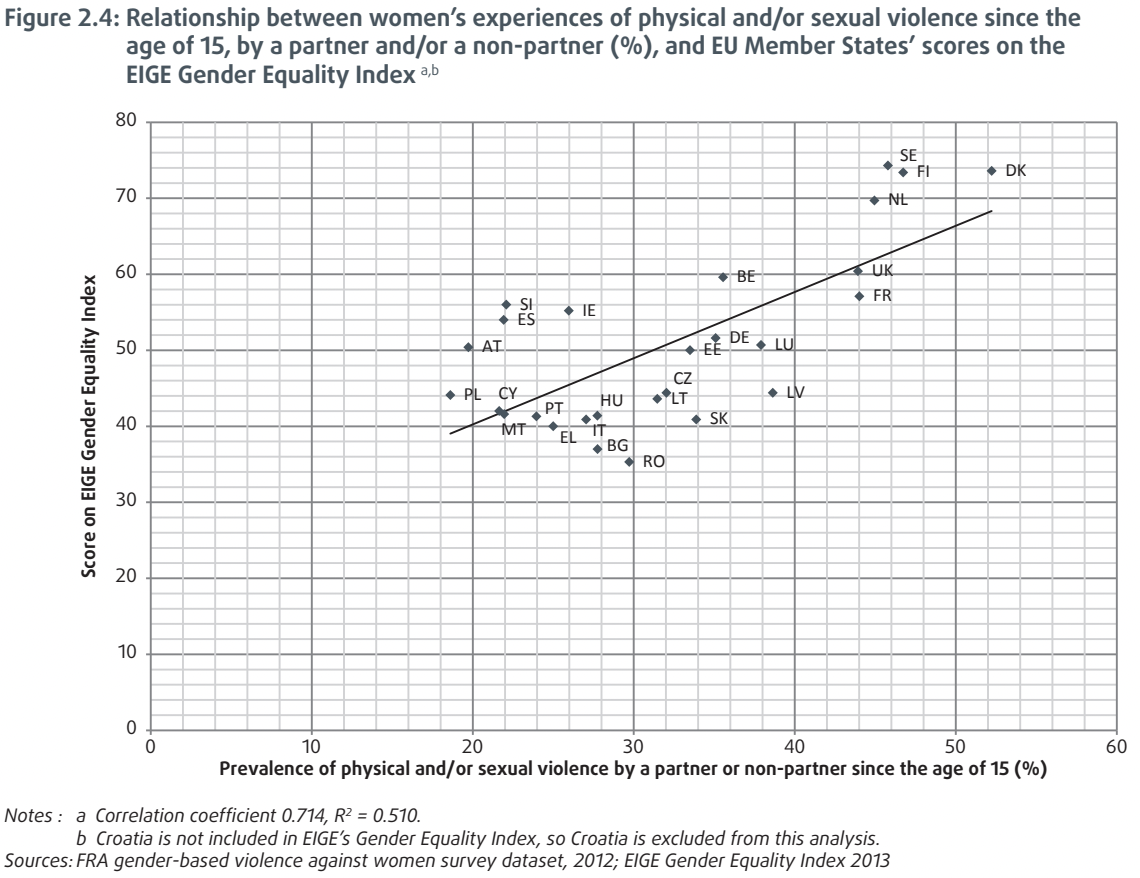
Source: for Fundamental Rights (2014)
Another such puzzle:
The integration paradox
 Source: Schaeffer and Kas (2021)
Source: Schaeffer and Kas (2021)
Another such puzzle:
The integration paradox
[...] greater familiarity with the culture and language and economic advancement can lead to greater consciousness of the reality of discrimination.
-- Portes, Parker, and Cobas (1980)
 Source: Schaeffer and Kas (2021)
Source: Schaeffer and Kas (2021)
How accurate do persons of immigrant origin perceive ethnic discrimination?
How accurate do persons of immigrant origin perceive ethnic discrimination?
Challenges
- No aggregate analysis: Measure actual and perceived discrimination for individuals.
How accurate do persons of immigrant origin perceive ethnic discrimination?
Challenges
No aggregate analysis: Measure actual and perceived discrimination for individuals.
Mis-perceptions ≠ correlation: Measure actual and perceived discrimination on the same scale.
How accurate do persons of immigrant origin perceive ethnic discrimination?
Challenges
No aggregate analysis: Measure actual and perceived discrimination for individuals.
Mis-perceptions ≠ correlation: Measure actual and perceived discrimination on the same scale.
Ethics: Researchers must not discriminate participants.
Central idea Mutual evaulation in behavioral games
- Two players' mutual evaluation.
- Clear metric: €.
→ Observe actual € sent.
→ Survey expected € received.
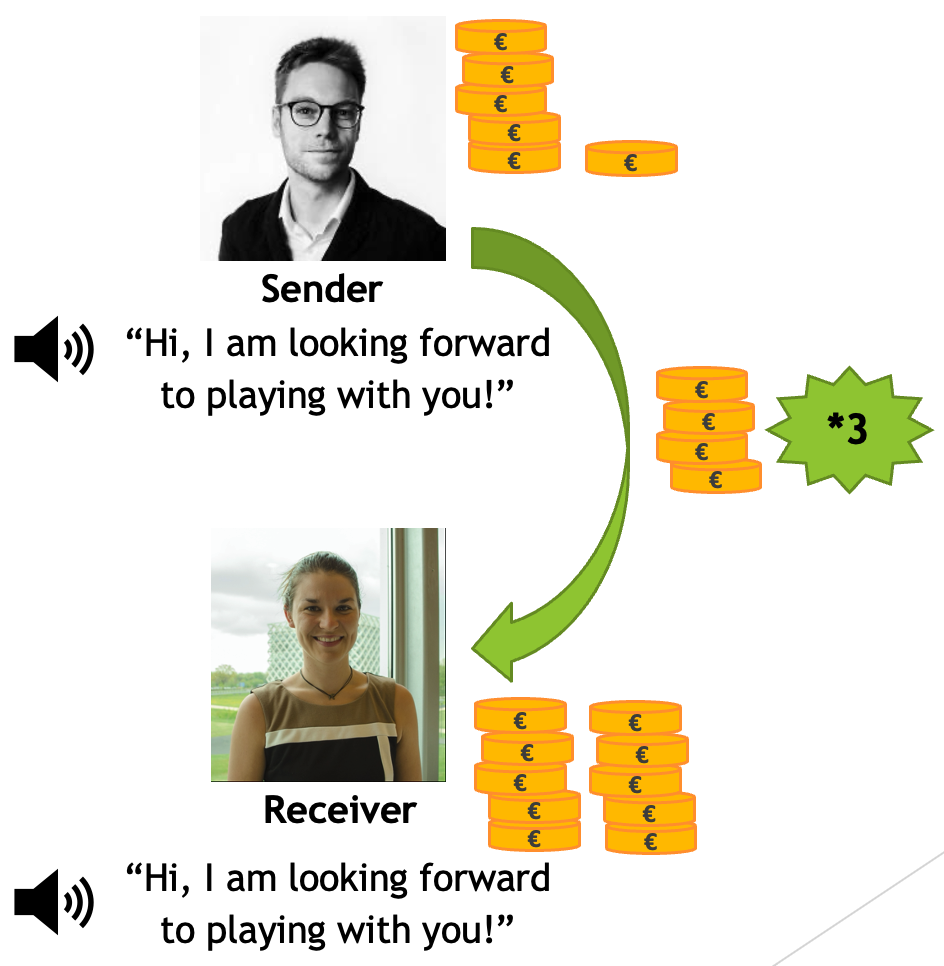
Central idea Mutual evaulation in behavioral games
- Two players' mutual evaluation.
- Clear metric: €.
→ Observe actual € sent.
→ Survey expected € received.
True first name & city of residence from registers
Alisina, Ahmad, Anne, Binyamin, Joyce, Somaia, Sarah, Hayriye, Saibe, Björn, Salem, Fabienne, Sadet, Linda, Margarita, Ali, Joseph, Mhd Kheir, Baran, Bahaa, Jebran, Reno, Seiji, Irina, Ajsel, Christine, Rahim, Yaw Abrefa, Mark, Anjali Dev, Elmar, Anke, Laura, Heiko, ...

10 Trust games per participant
- Mainstream1 participants:
- 3 games with mainstream players.
- 7 games with immigrant origin players.
- Immigrant origin2 participants:
- 7 games with mainstream players.
- 3 games with immigrant origin players.
→ Observe actual € sent to others.
1: Born in Germany and both parents born in Germany.
2: Born abroad or at least one parent born abroad.

10 Trust games per participant
- Mainstream1 participants:
- 3 games with mainstream players.
- 7 games with immigrant origin players.
- Immigrant origin2 participants:
- 7 games with mainstream players.
- 3 games with immigrant origin players.
→ Observe actual € sent to others.
1: Born in Germany and both parents born in Germany.
2: Born abroad or at least one parent born abroad.
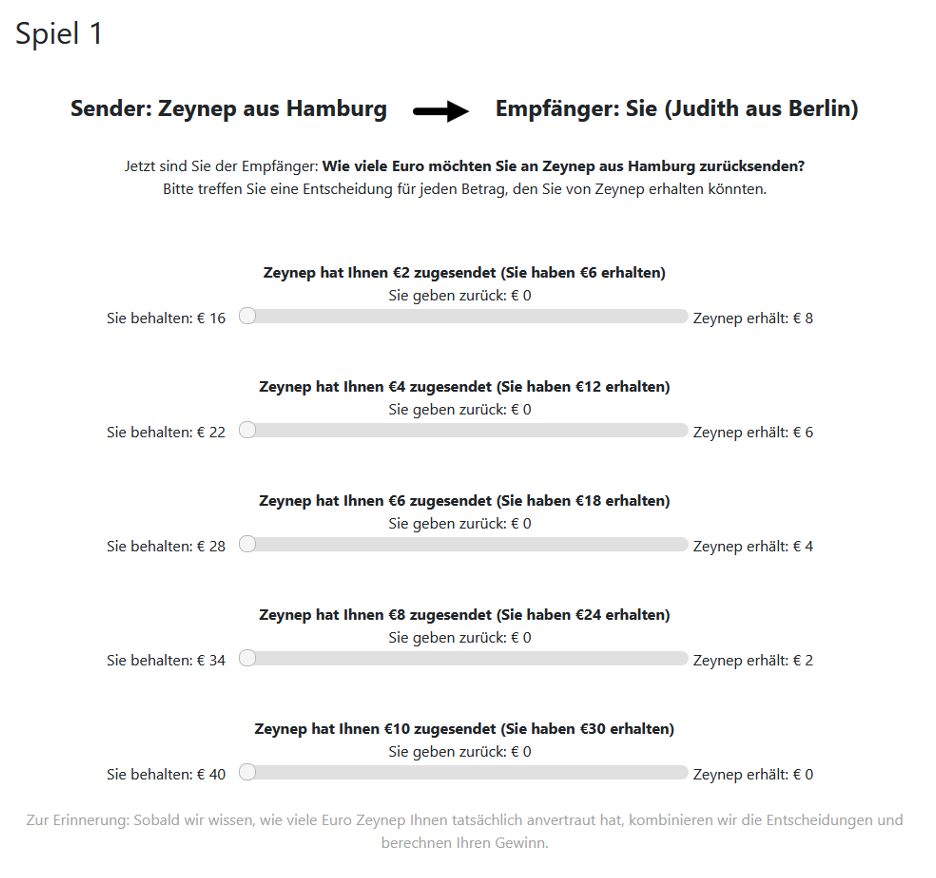
Sample
1 Pre-game survey Jul-Oct '21 → 2 Trust games Nov-Dec '21 → 3 Pay-out experiment Mar '22
Sample
1 Pre-game survey Jul-Oct '21 → 2 Trust games Nov-Dec '21 → 3 Pay-out experiment Mar '22
Stratified random sample from German registers.
Invitation via postal mail.
Online surveys/games in German.
Response rate approx. 12%-4%.
| imor | Hamburg | Köln | Frankfurt am Main | München | Berlin | All | |
|---|---|---|---|---|---|---|---|
| Mainstream | N | 198 | 222 | 204 | 184 | 243 | 1051 |
| % row | 18.8 | 21.1 | 19.4 | 17.5 | 23.1 | 100.0 | |
| Immigrant | N | 118 | 90 | 113 | 153 | 101 | 575 |
| % row | 20.5 | 15.7 | 19.7 | 26.6 | 17.6 | 100.0 | |
| Child of immigrant | N | 66 | 100 | 61 | 84 | 72 | 383 |
| % row | 17.2 | 26.1 | 15.9 | 21.9 | 18.8 | 100.0 | |
| All | N | 382 | 412 | 378 | 421 | 416 | 2009 |
| % row | 19.0 | 20.5 | 18.8 | 21.0 | 20.7 | 100.0 |
Actual trust discrimination by game partner
Act Discrij=€ij−¯€j(Germ. name)
| Name | N | % |
|---|---|---|
| Name not distinct from German | 2699 | 36.2 |
| Distinct Non-German name | 4760 | 63.8 |
Actual trust discrimination by game partner
Act Discrij=€ij−¯€j(Germ. name)
| Name | N | % |
|---|---|---|
| Name not distinct from German | 2699 | 36.2 |
| Distinct Non-German name | 4760 | 63.8 |

Actual trust discrimination avg. by person
¯Act Discri=nj∑j=1Act Discrijnj
| Name | N | % |
|---|---|---|
| Name not distinct from German | 348 | 36.3 |
| Distinct Non-German name | 610 | 63.7 |

After the 10 games Expectations
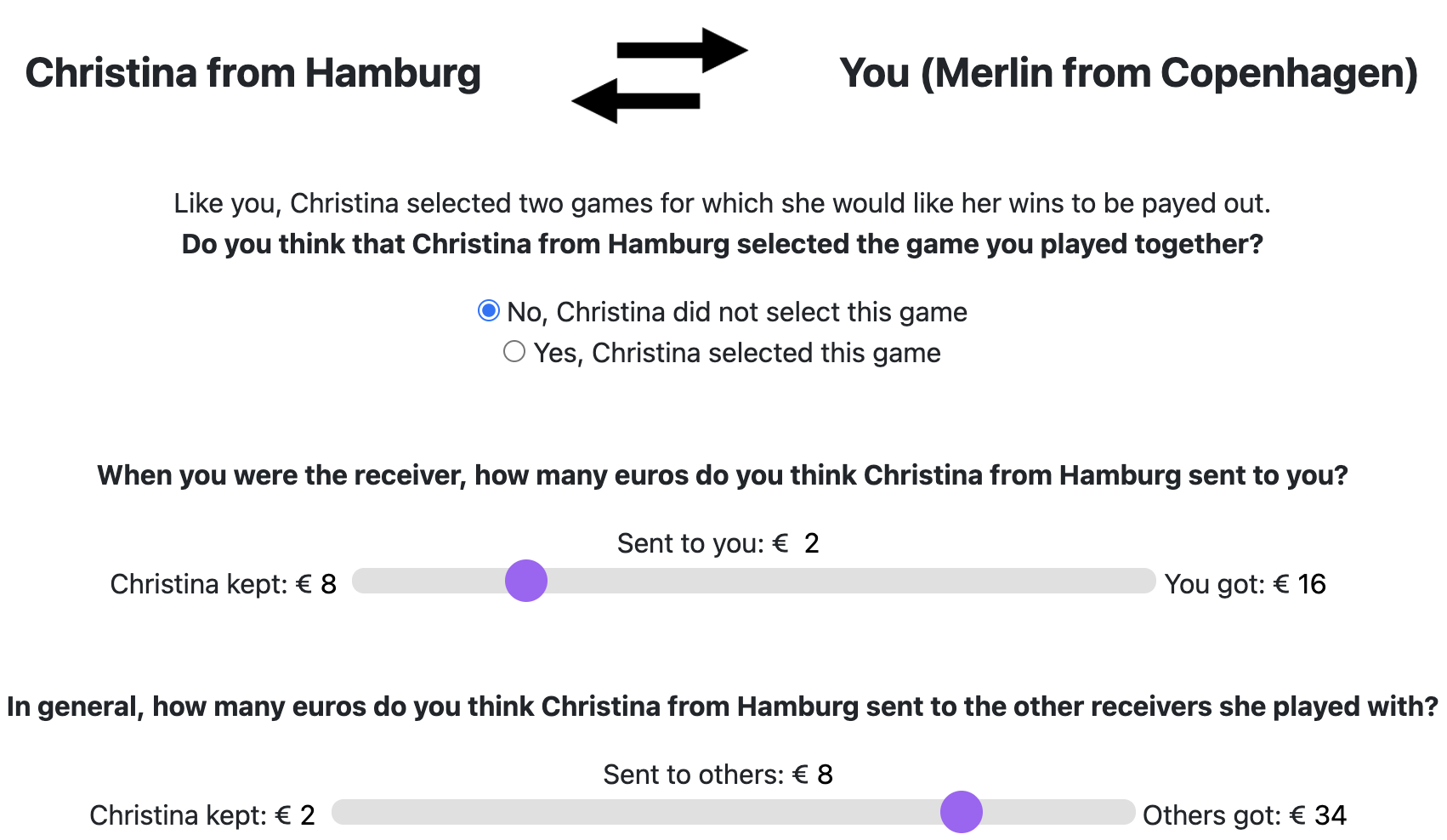
Actual & expected discrimination
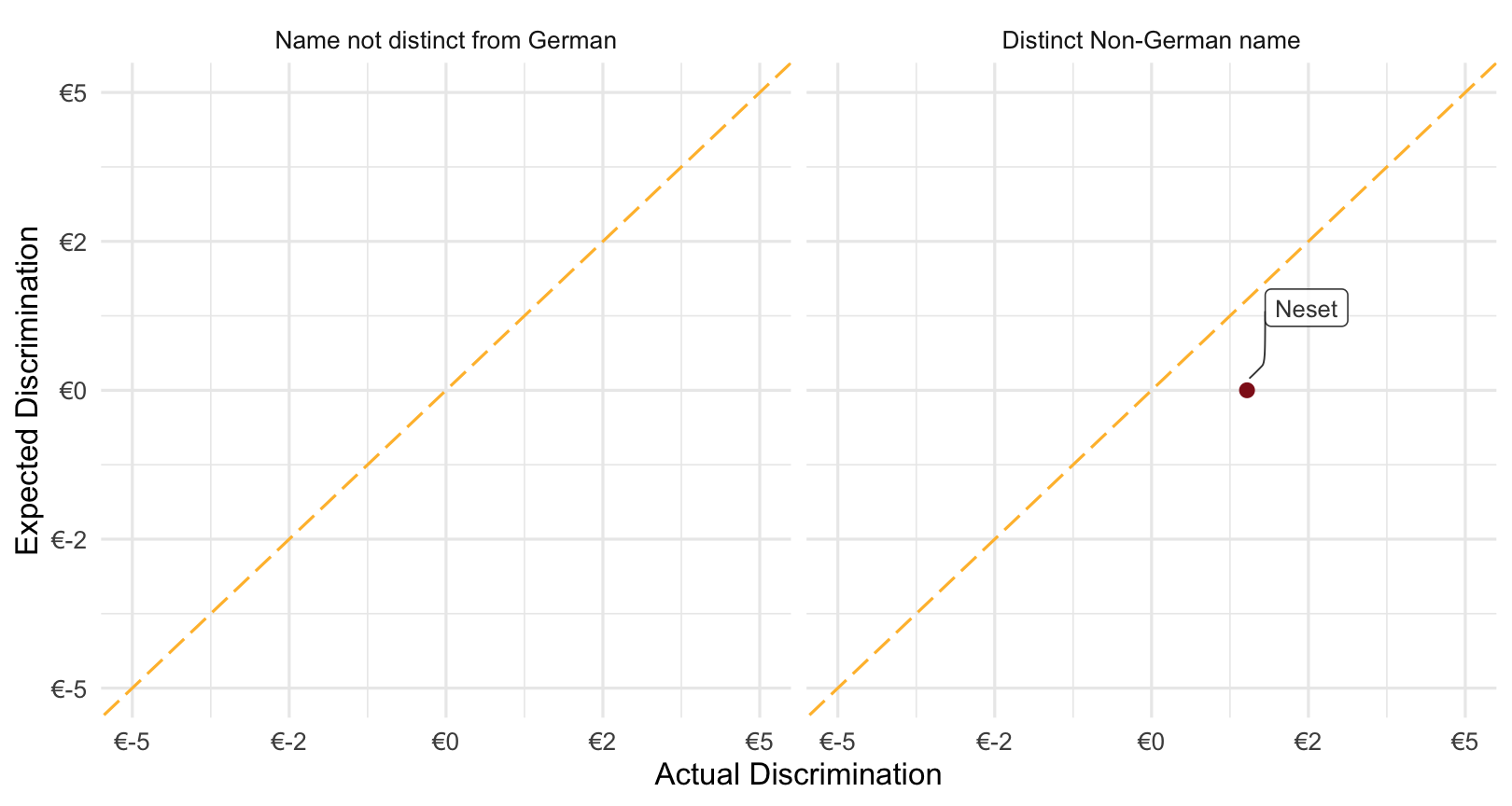
Actual & expected discrimination
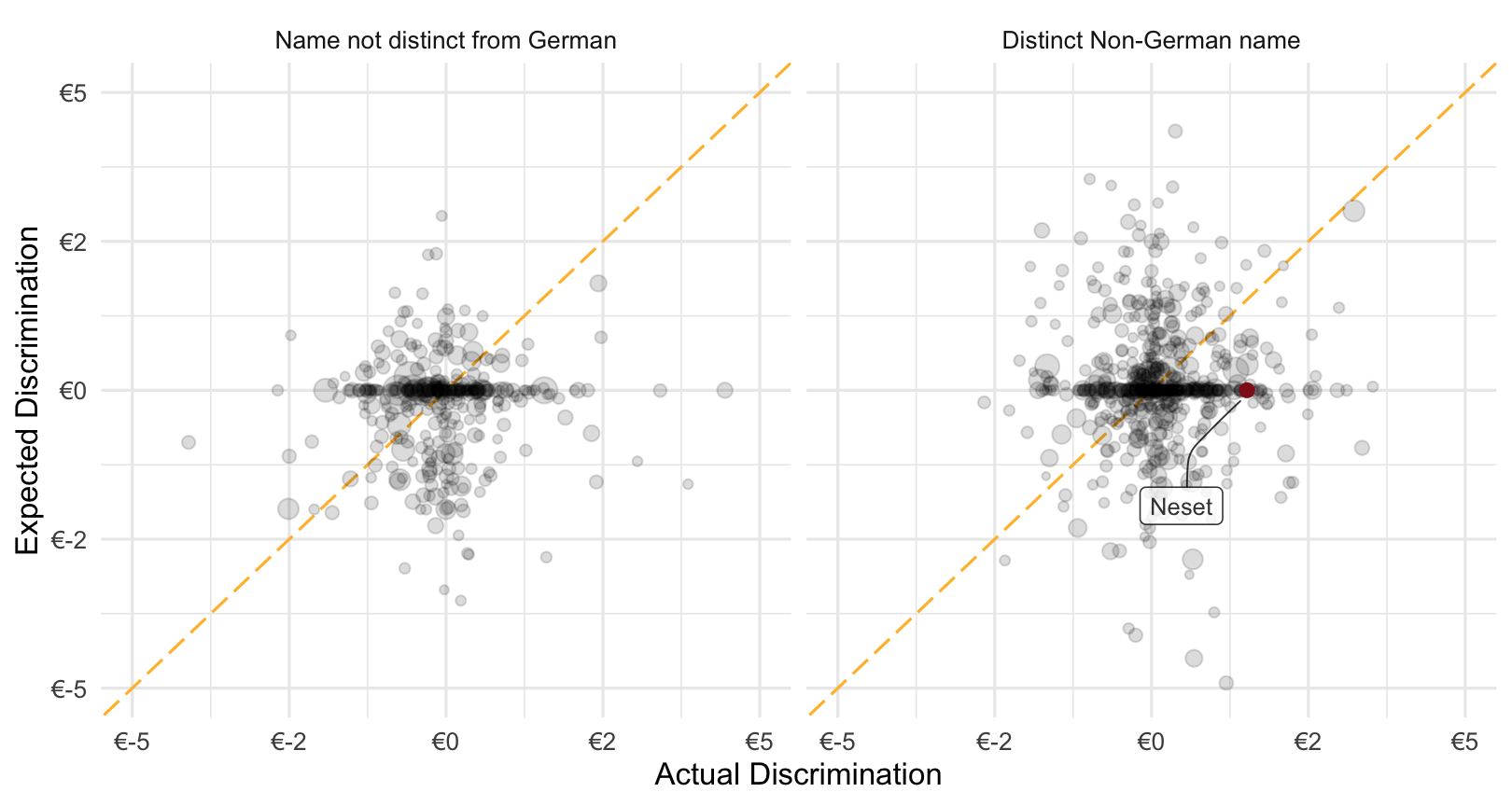
Actual & expected discrimination
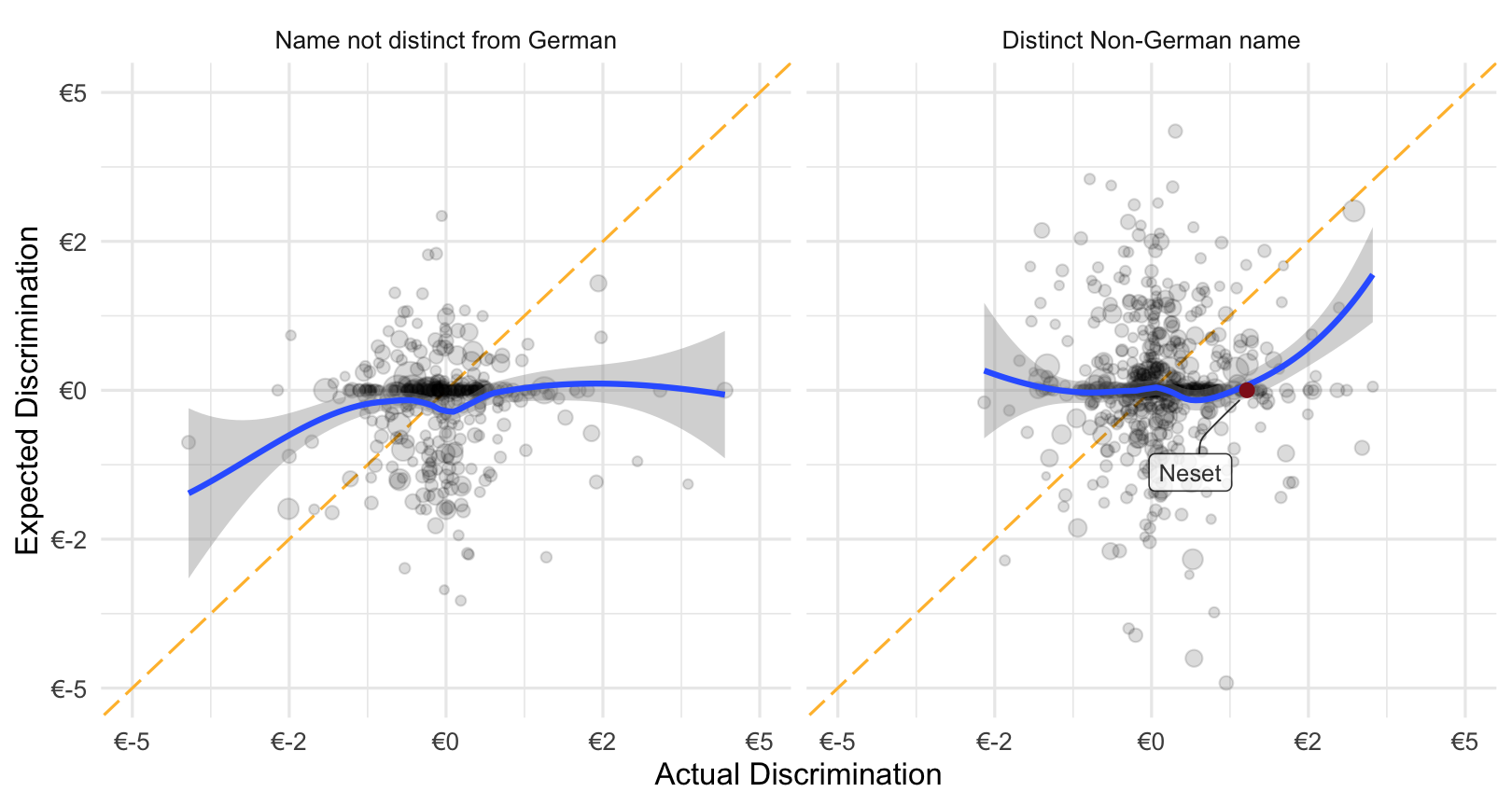
Alternative measure

Actual selection

Actual & expected selection
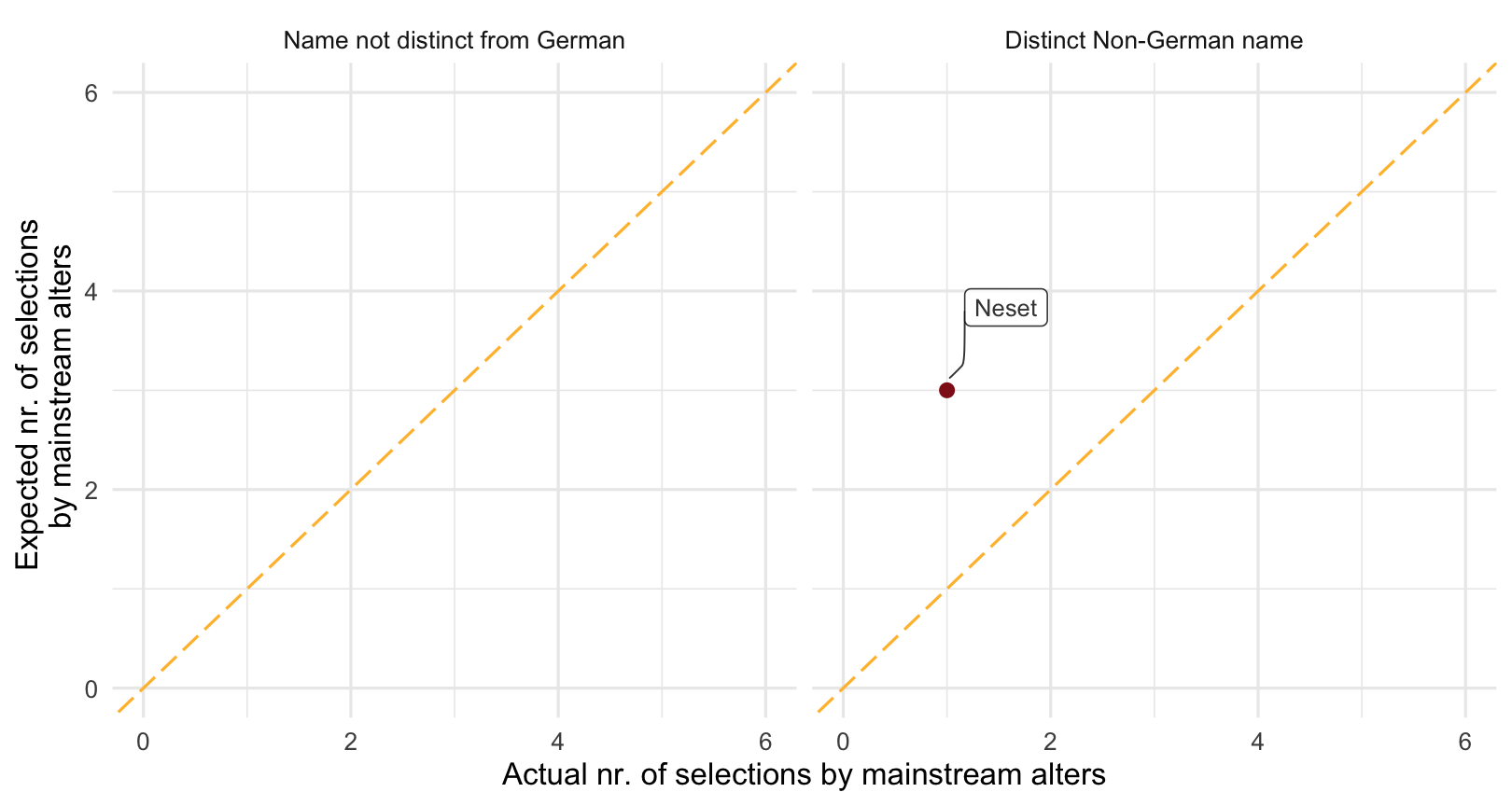
Actual & expected selection
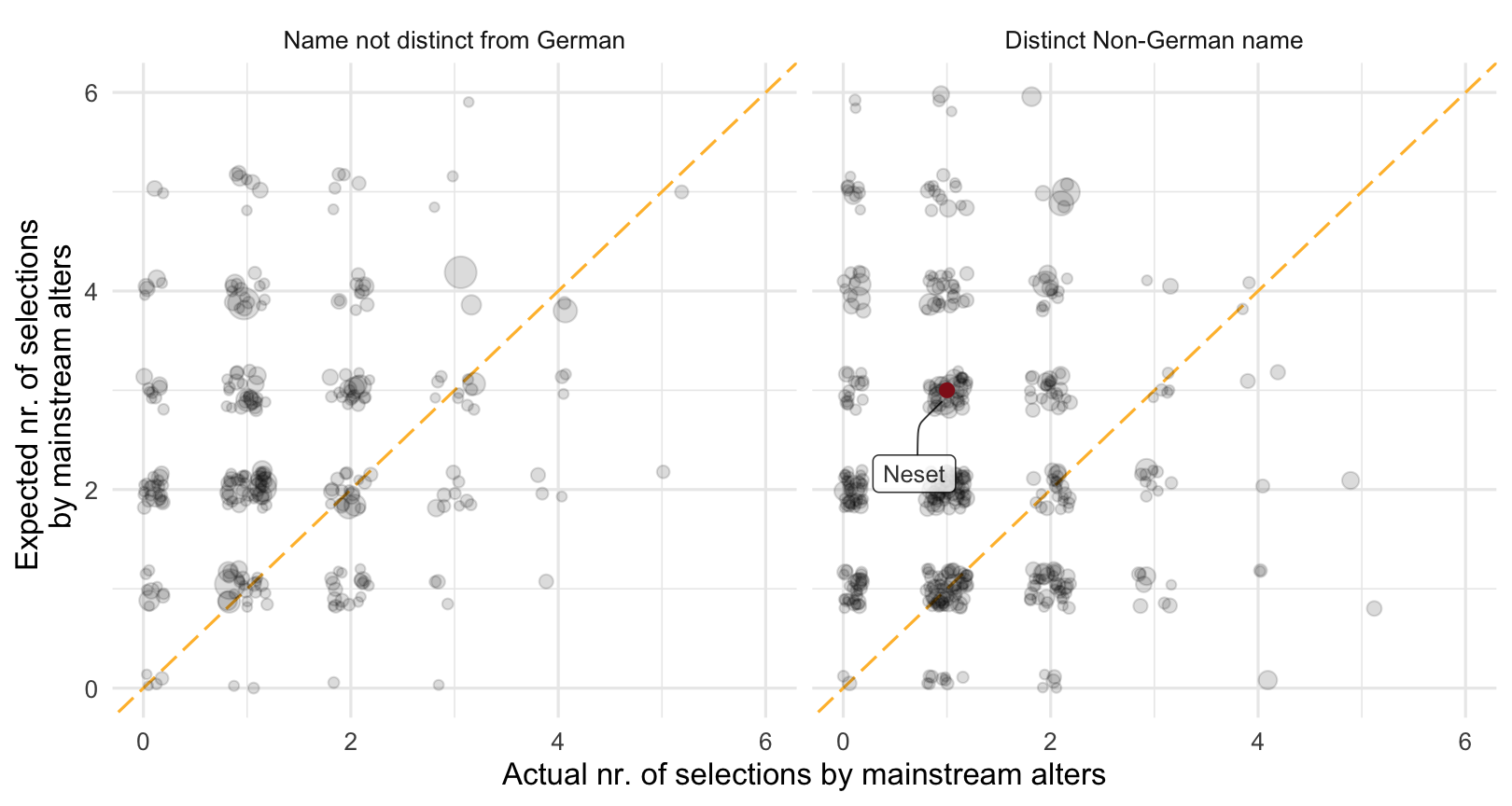
Actual & expected selection
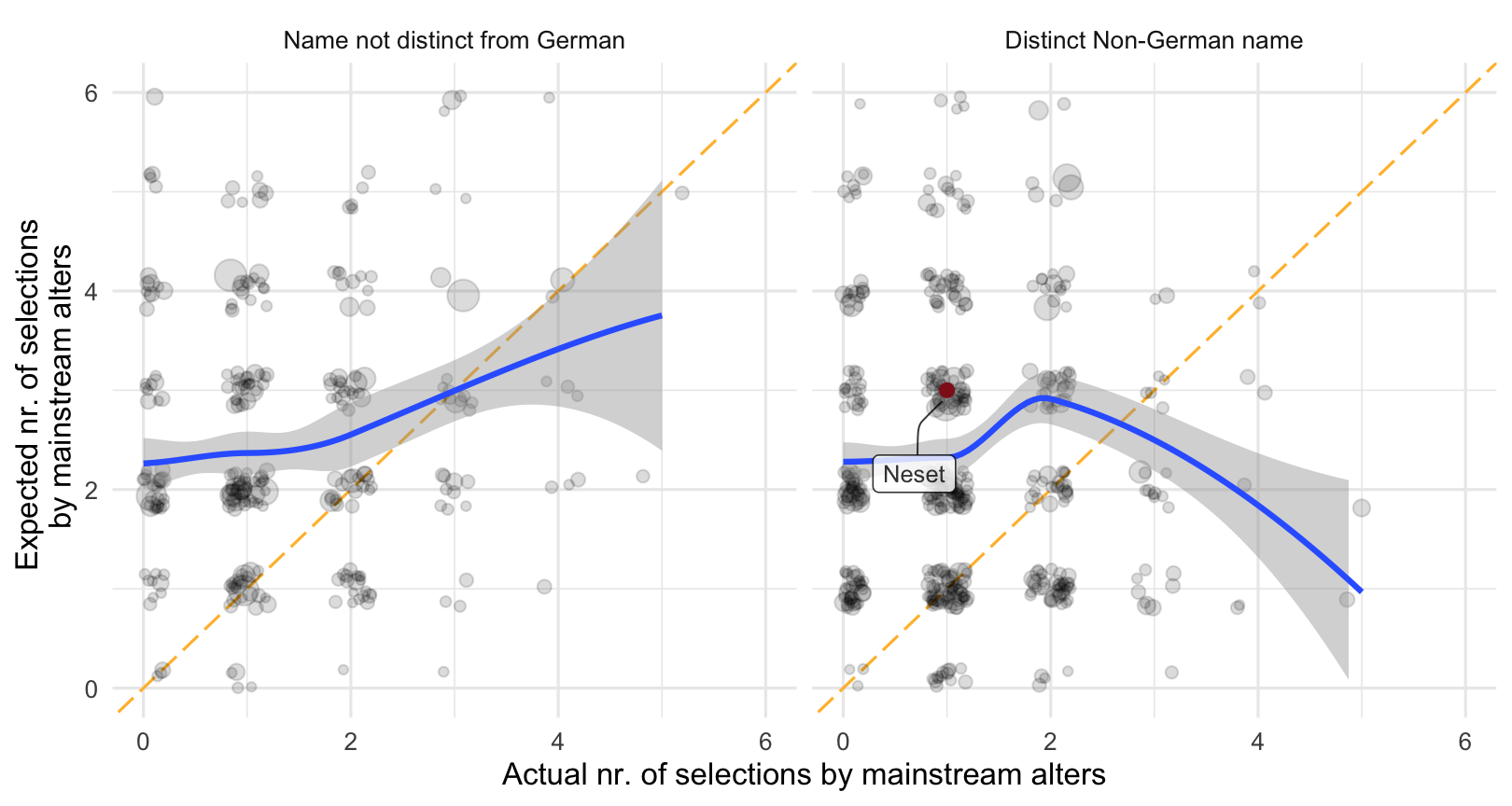
Intermediate conclusion
- On average, immigrant minorities do not (mis-)expect to be discriminated.
- Discrimination is not a lens through which immigrant minorities frame any random interaction.

Expected ≠ perceived discrimination

Do immigrant minorities (mis-)perceive discrimination when they asked to frame a cue of ethnic inequality?
Follow-up experiment Disadvantage cue
On average, your ten game partners sent and thereby entrusted 6 € to you.
In addition, your ten game partners played trust games with other 68 more participants. 25 of these other participants had names that sound typically German.
Below you see a selection of three of these participants with names that sound typically German.
On average, your game partners sent and thereby entrusted 8 € to these three persons:
Annegret from Hamburg
Klaus from Berlin
Hartmut from München
The three have thus received 2 € more than you. How do you rate this result?
Follow-up experiment Advantage cue
On average, your ten game partners sent and thereby entrusted 8 € to you.
In addition, your ten game partners played trust games with other 68 more participants. 25 of these other participants had names that sound typically German.
Below you see a selection of three of these participants with names that sound typically German.
On average, your game partners sent and thereby entrusted 6 € to these three persons:
Annegret from Hamburg
Klaus from Berlin
Hartmut from München
The three have thus received 2 € less than you. How do you rate this result?
Follow-up experiment Equality cue
On average, your ten game partners sent and thereby entrusted 7 € to you.
In addition, your ten game partners played trust games with other 68 more participants. 25 of these other participants had names that sound typically German.
Below you see a selection of three of these participants with names that sound typically German.
On average, your game partners sent and thereby entrusted 7 € to these three persons:
Annegret from Hamburg
Klaus from Berlin
Hartmut from München
The three have thus received the same amount as. How do you rate this result?
May name played a role ...

May name played a role ...

May name played a role ...

"Were participants called Merlin generally
advantaged, treated equally, or disadvantaged by their game partners?"

"Were participants called Merlin generally
advantaged, treated equally, or disadvantaged by their game partners?"
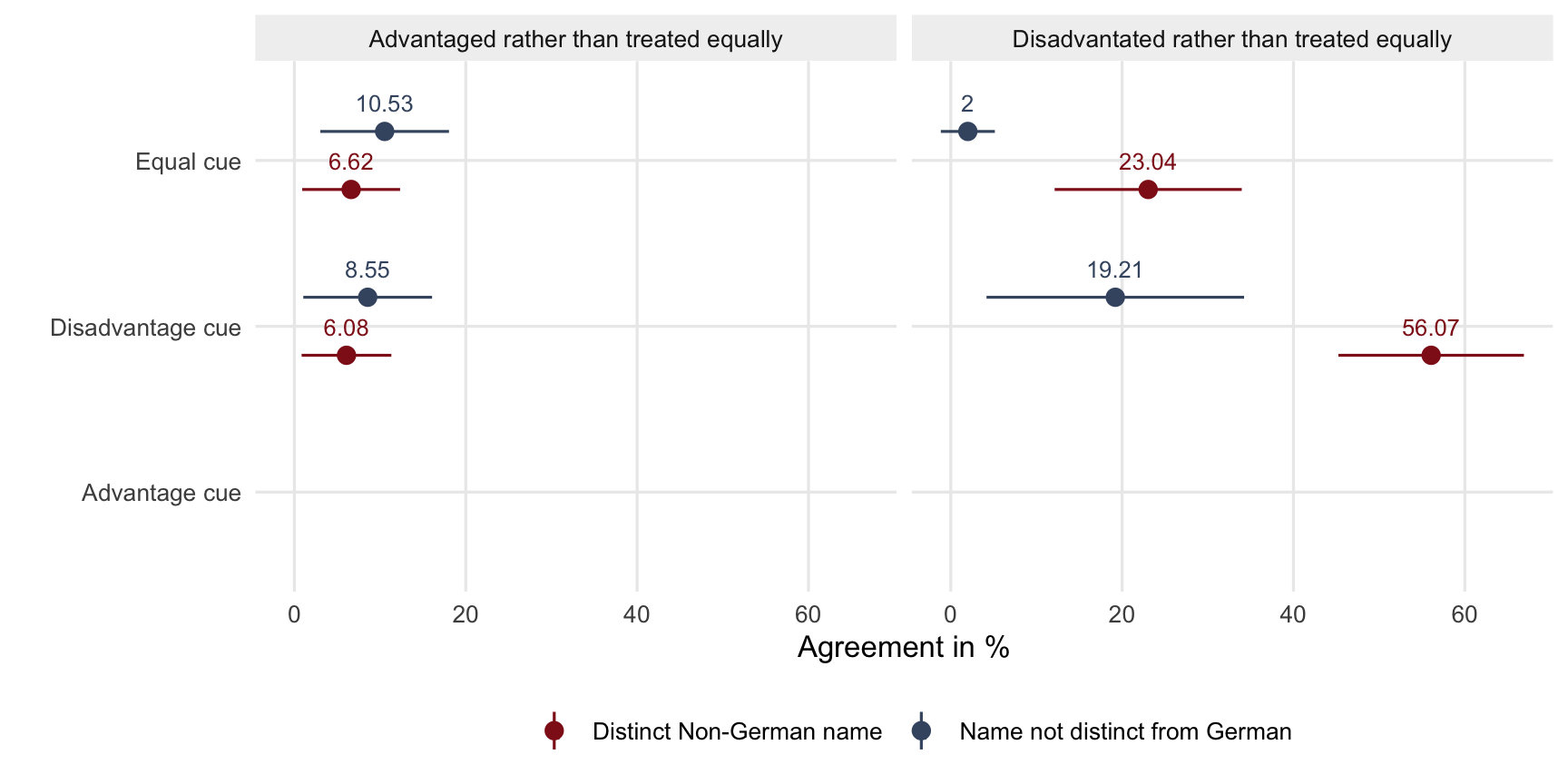
"Were participants called Merlin generally
advantaged, treated equally, or disadvantaged by their game partners?"
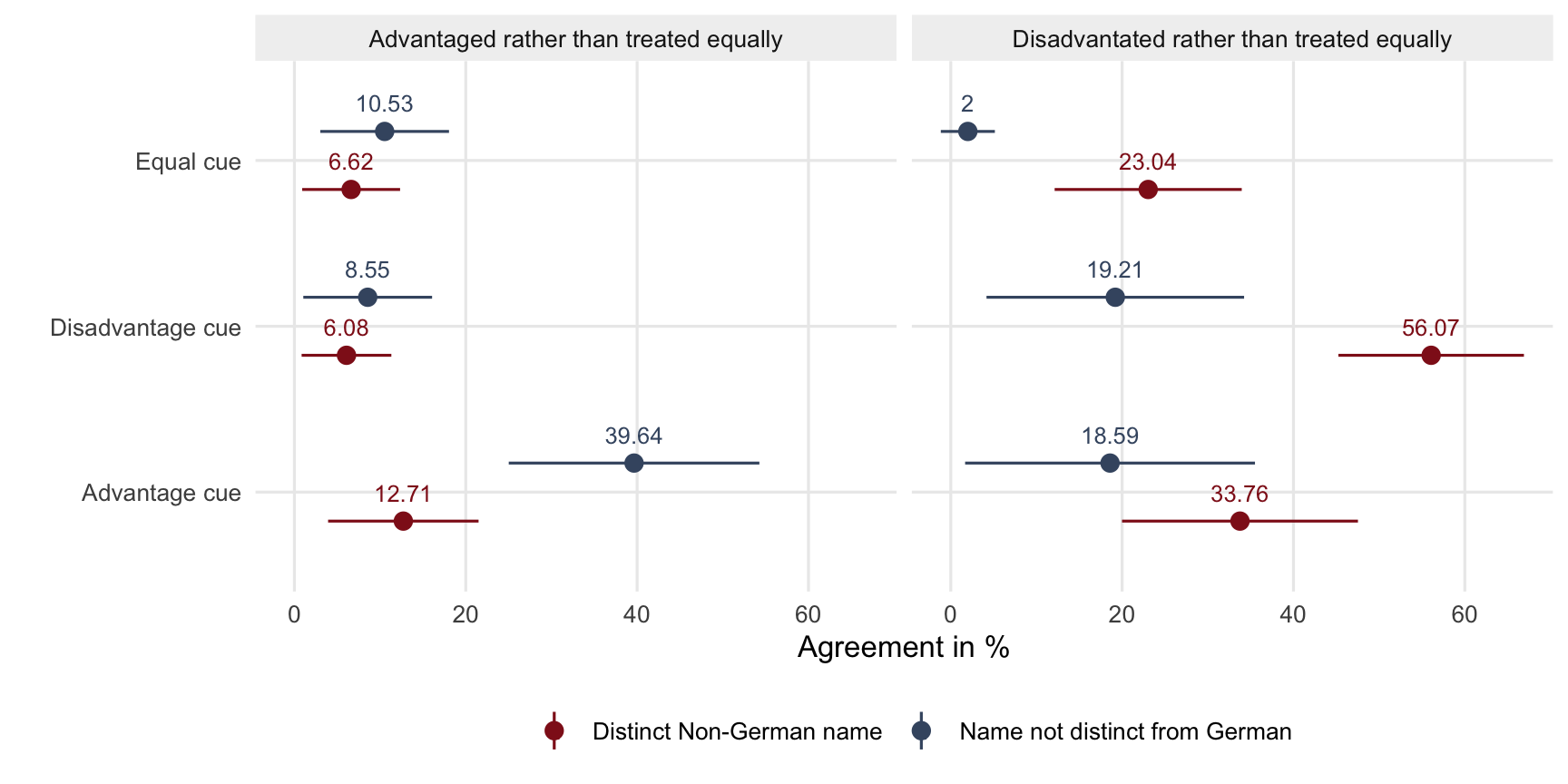
Intermediate conclusion
- On average, people expect no discrimination, but perceive it once ethnicity is made salient.
- ... even under the equal cue!
- Immigrant minorities with a German-sounding name are perceiving advantage similar to those with a non-German name perceiving disadvantage.
- People generalize their personal experience to equivalent others ≈ 1:1.
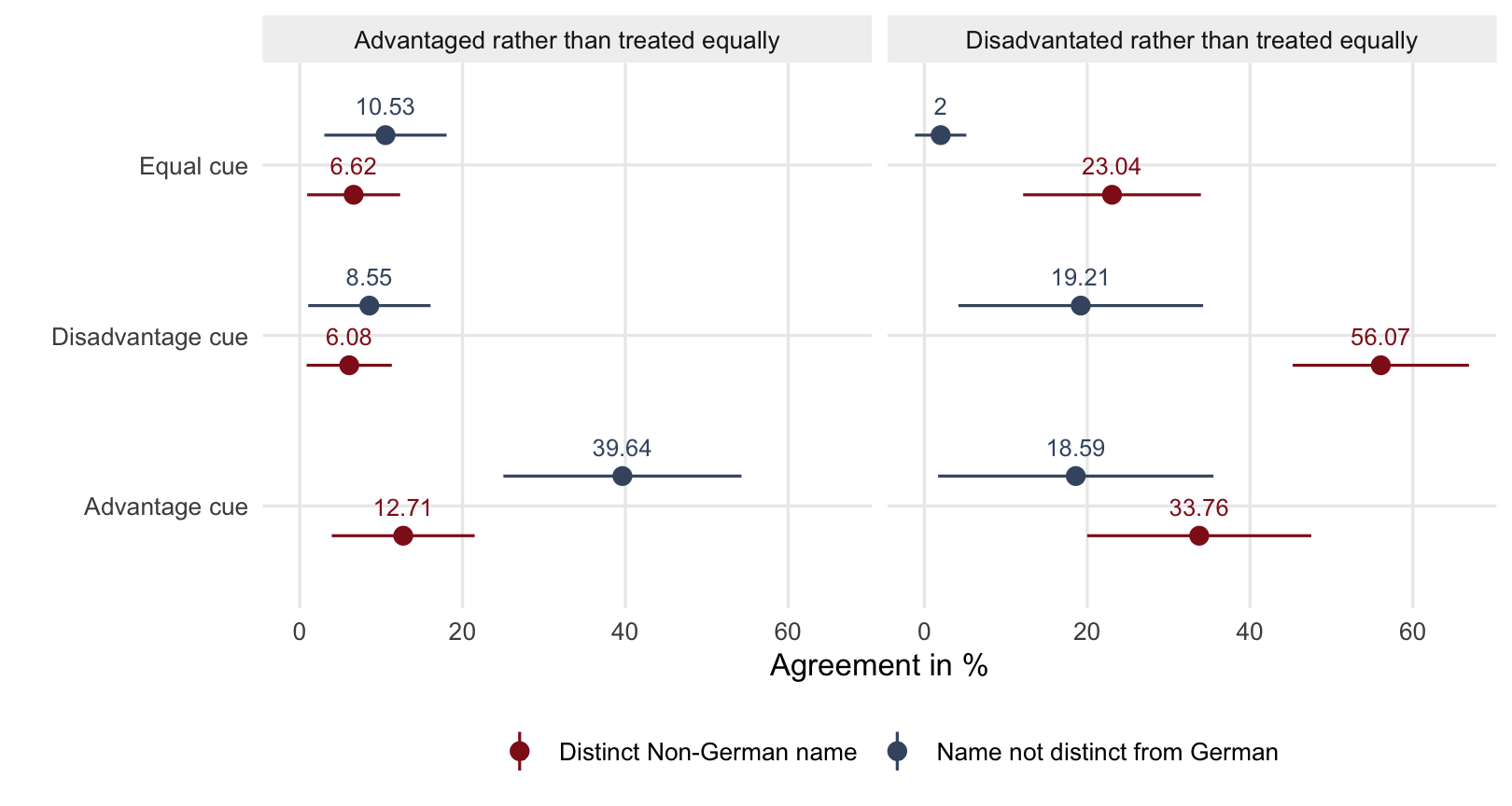
But how accurate are these perceptions about ...
whether their name did (not) play a role?
whether Merlins were generally:
(today focus on) disadvantaged?
Accurate perceptions My name played a role
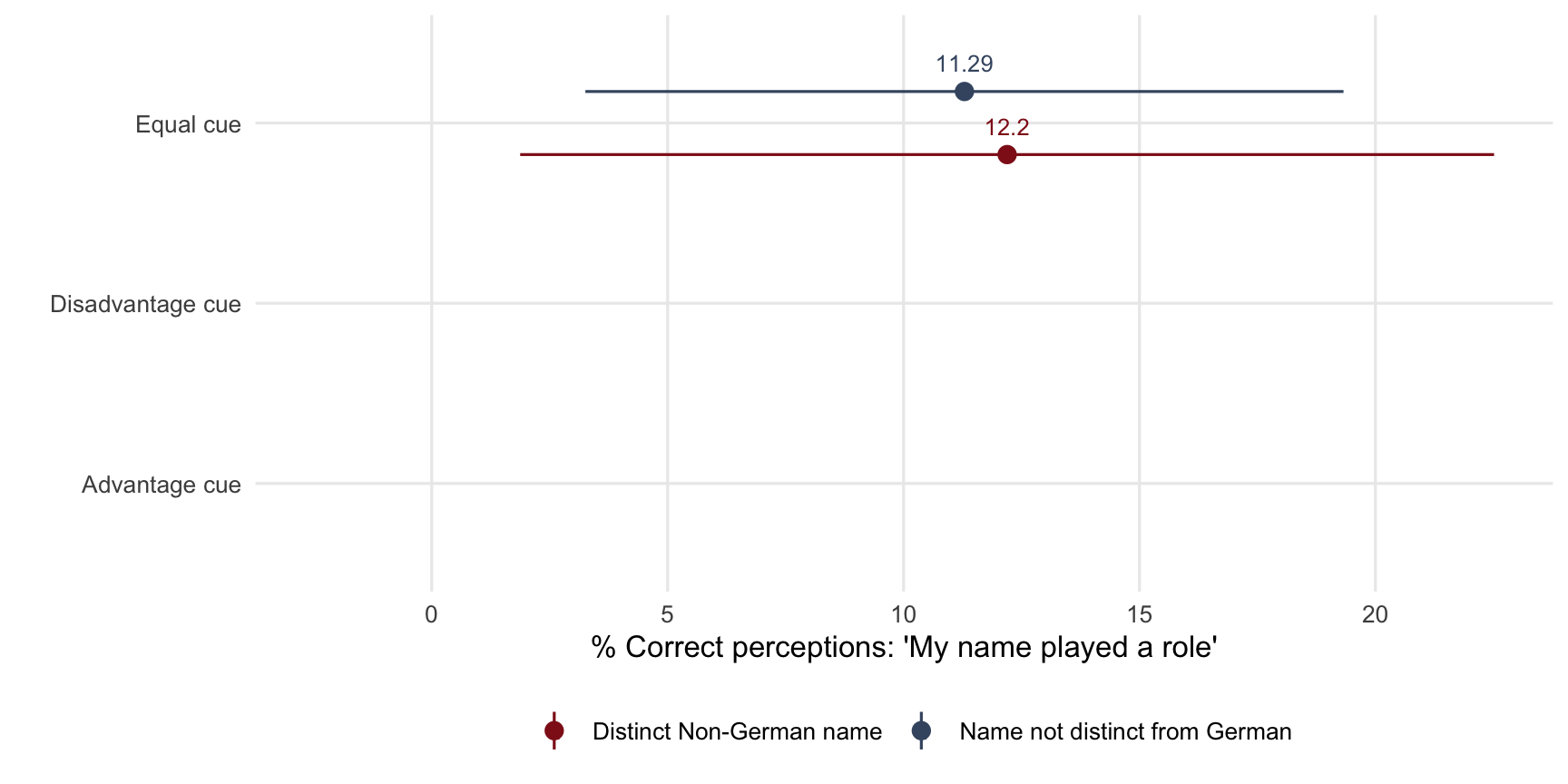
Accurate perceptions My name played a role
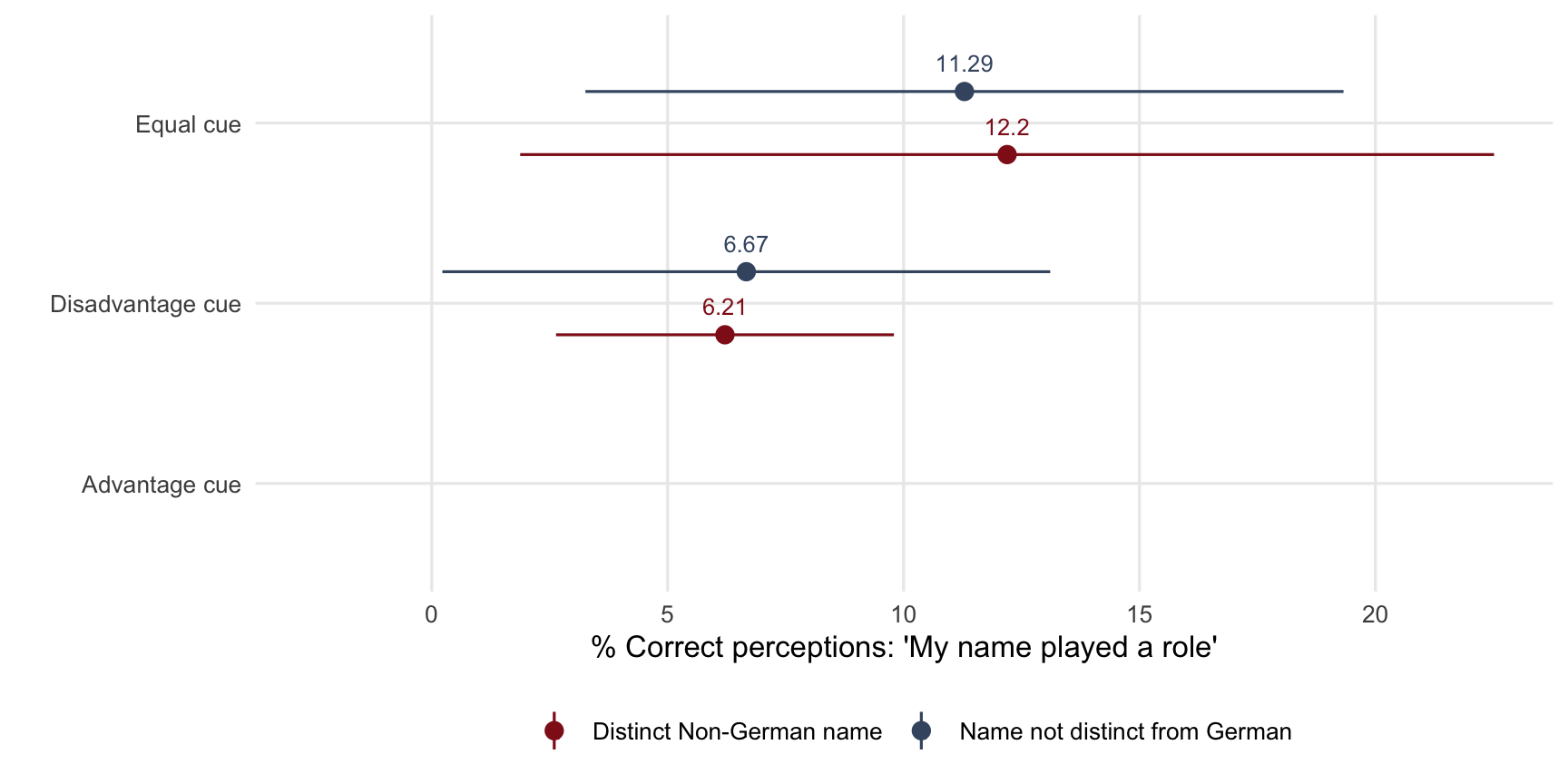
Accurate perceptions My name played a role
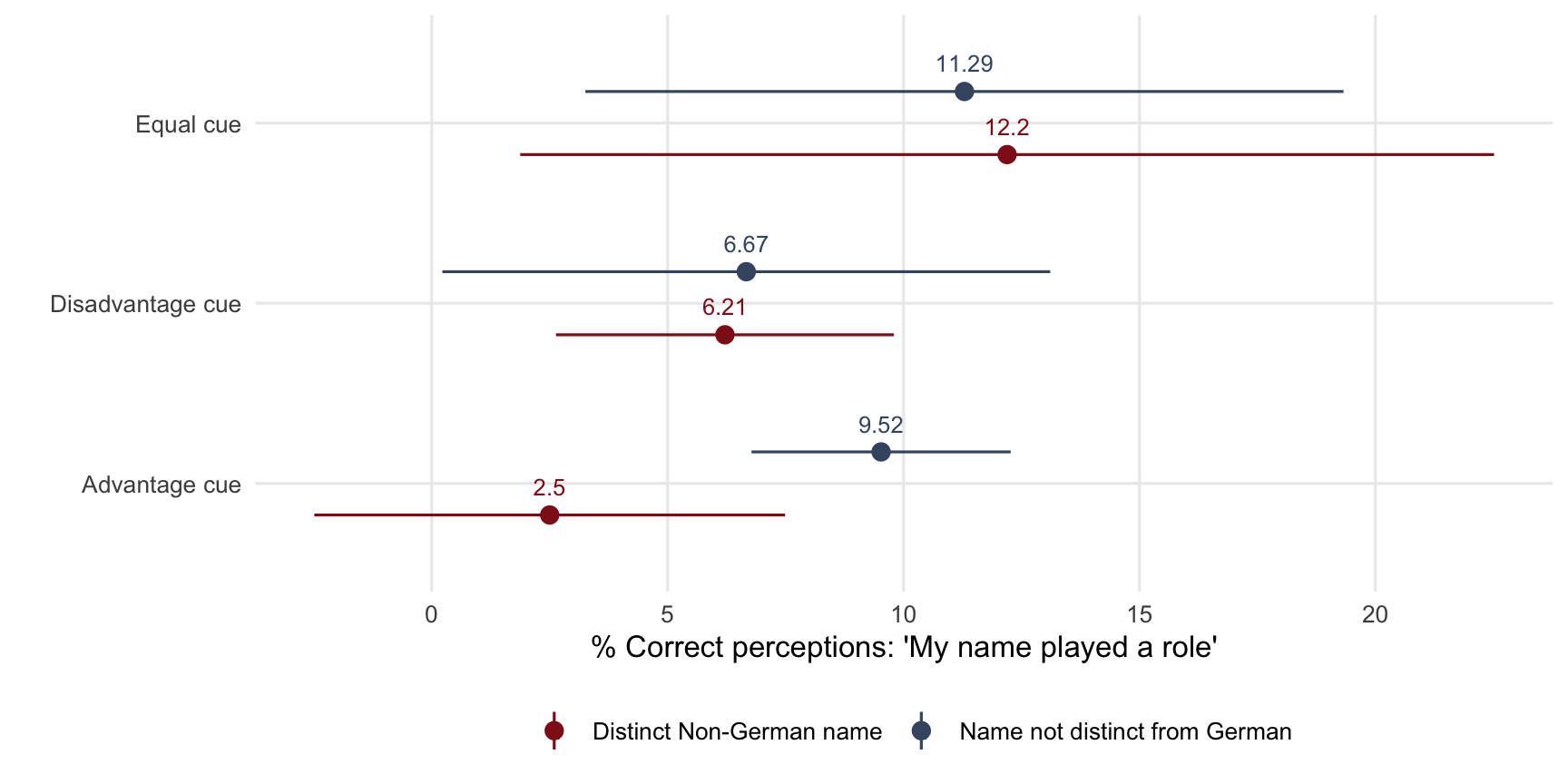
Accurate perceptions My name played a role
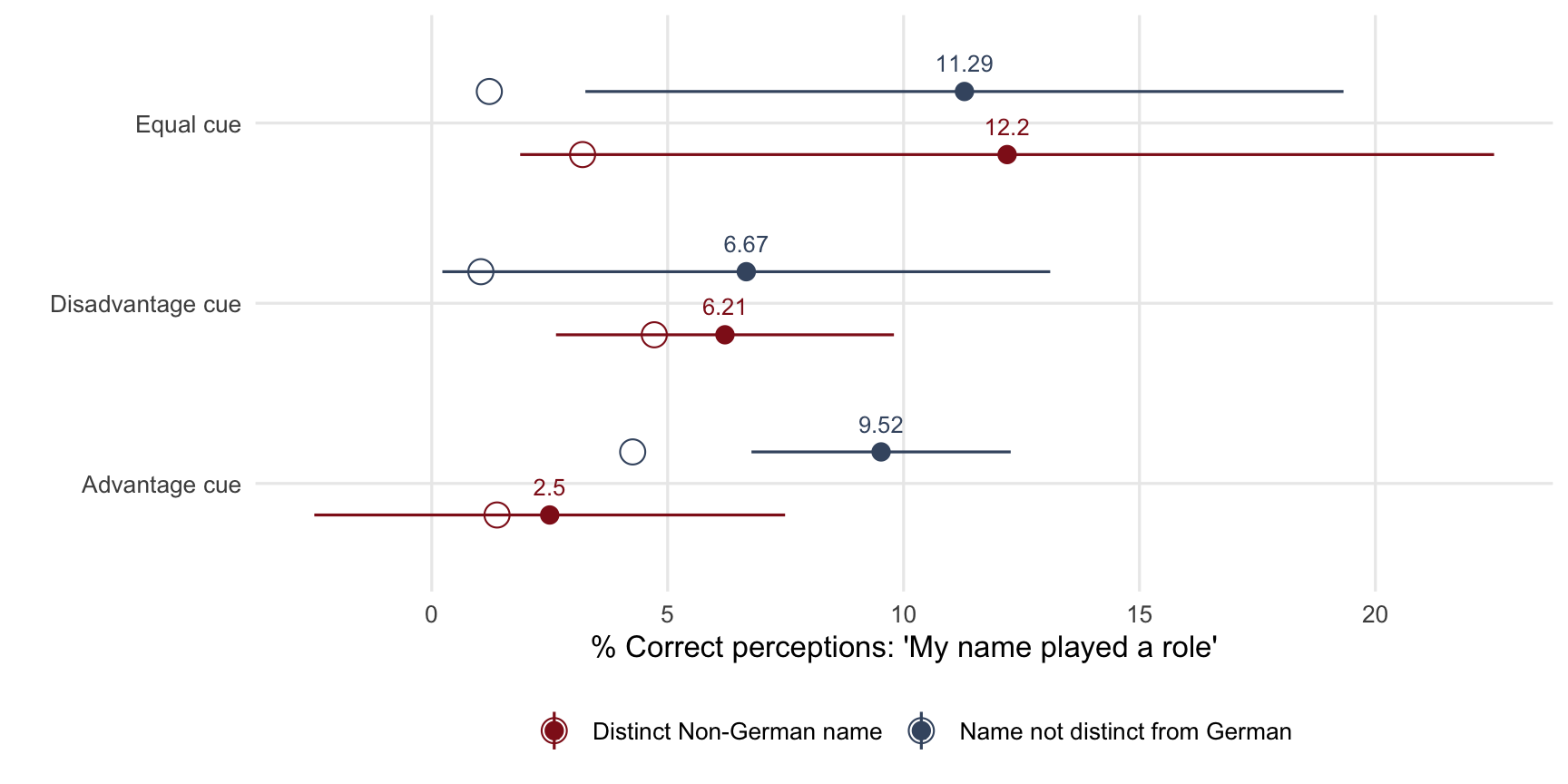
Accurate perceptions People with my name
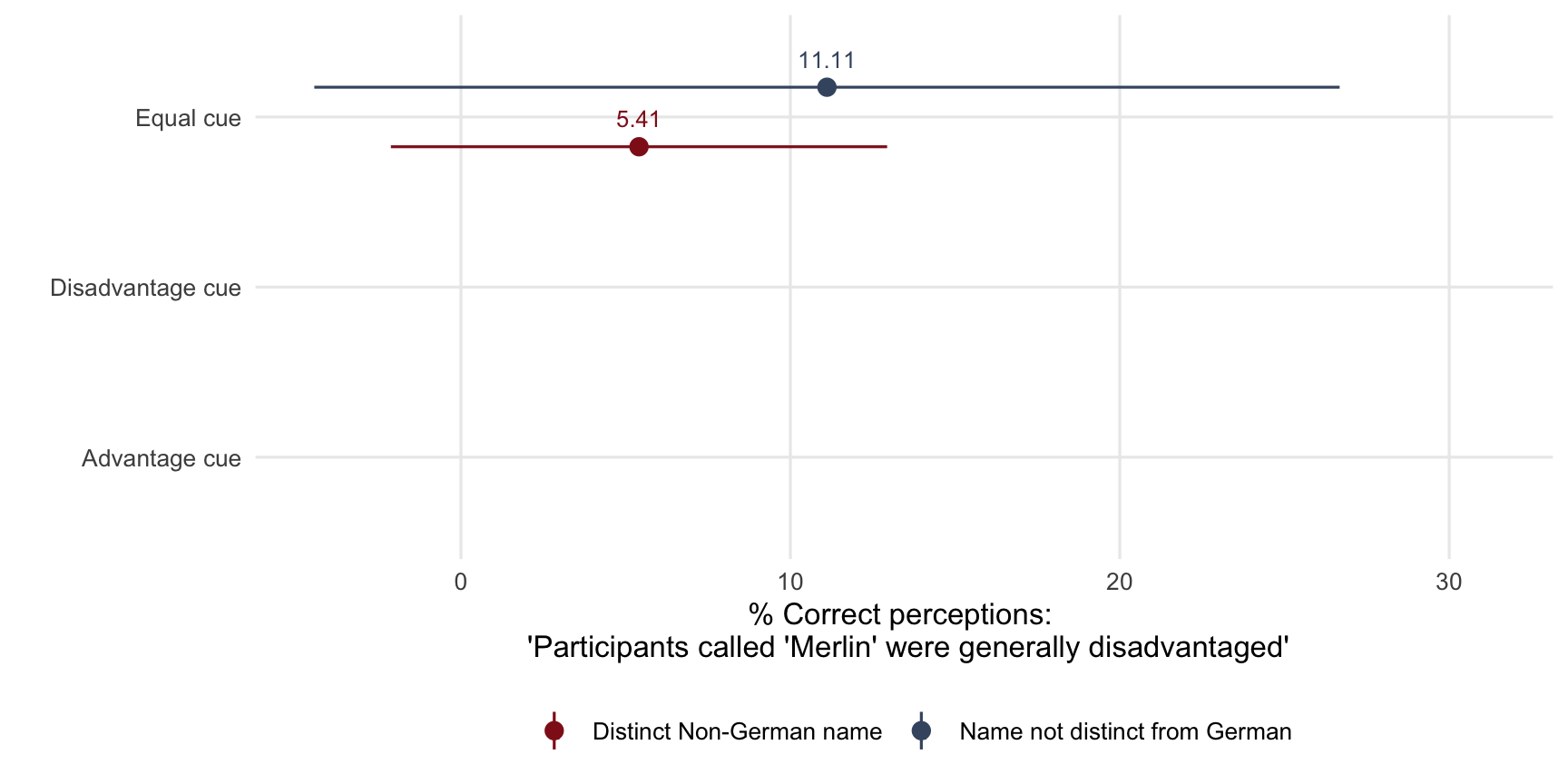
Accurate perceptions People with my name
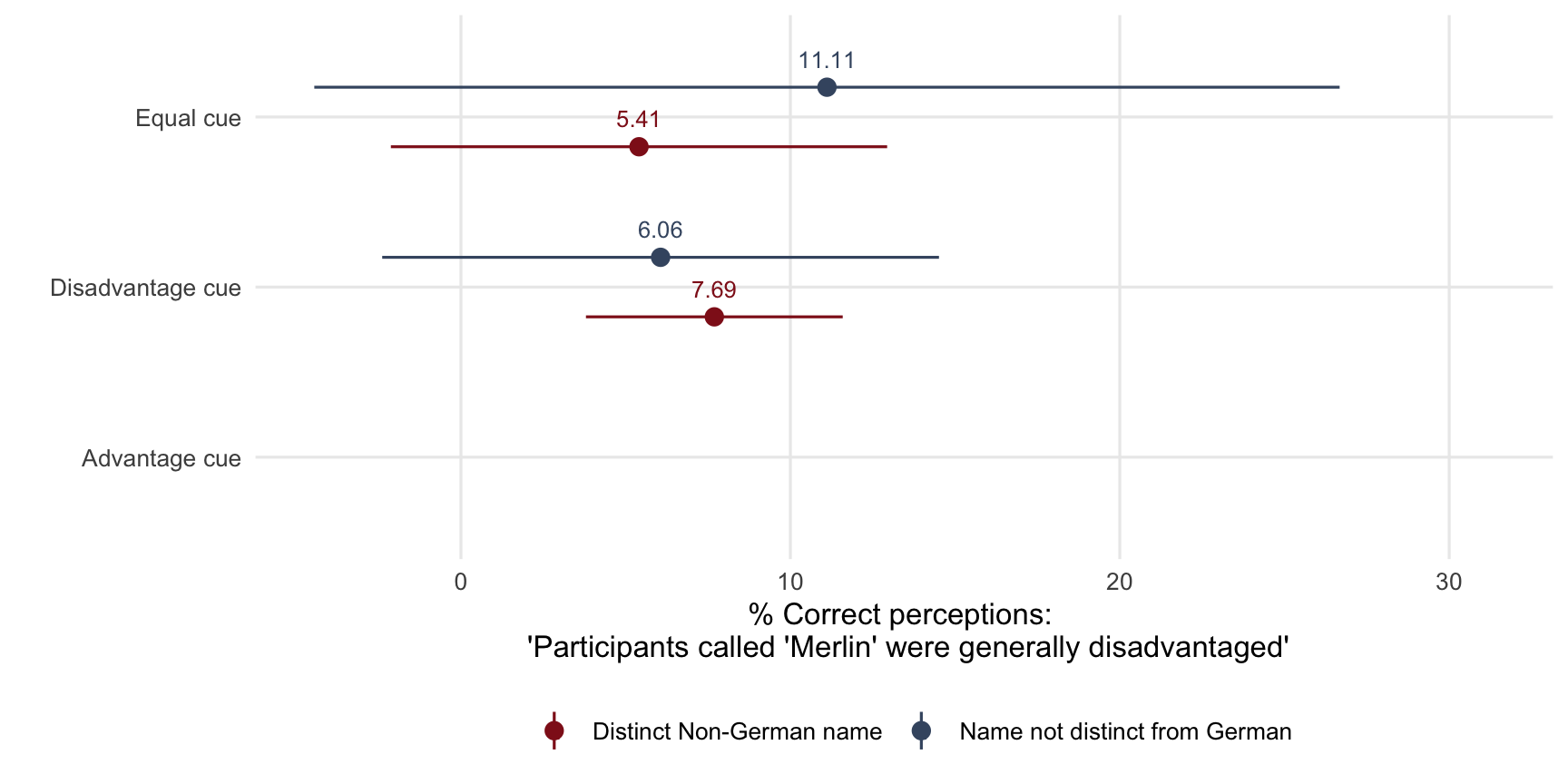
Accurate perceptions People with my name
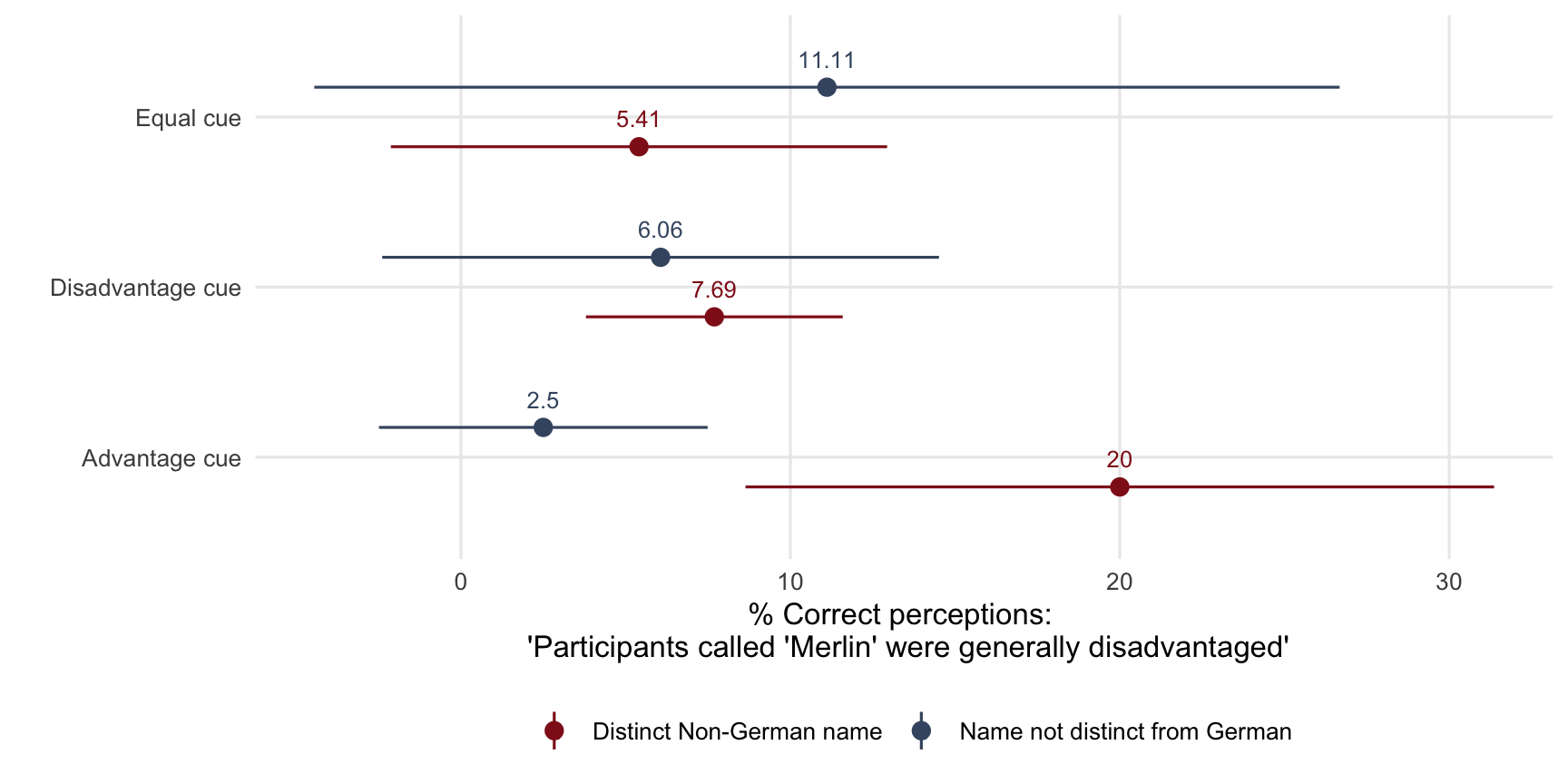
Accurate perceptions People with my name
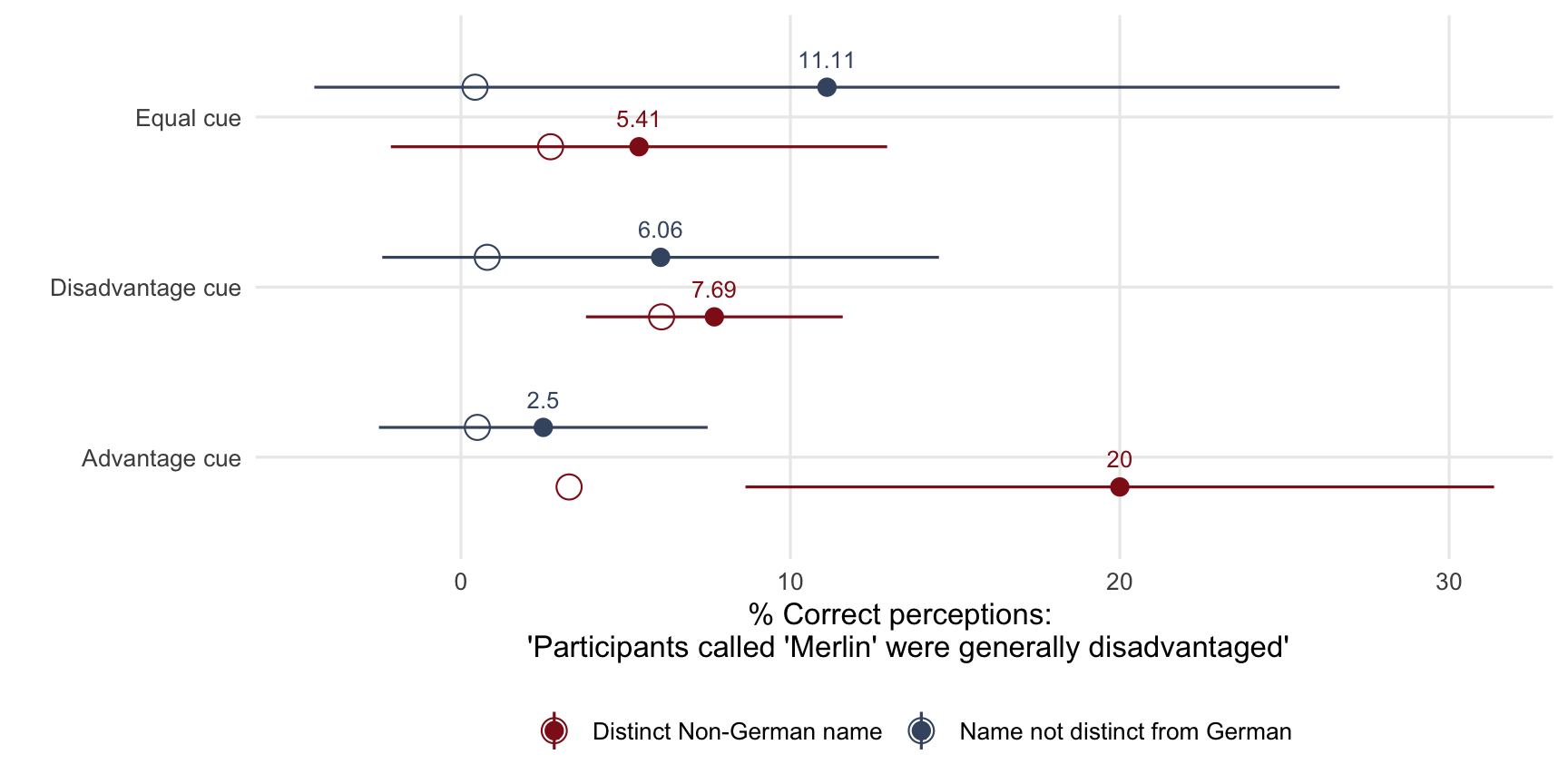
Complex data and no blueprint ...
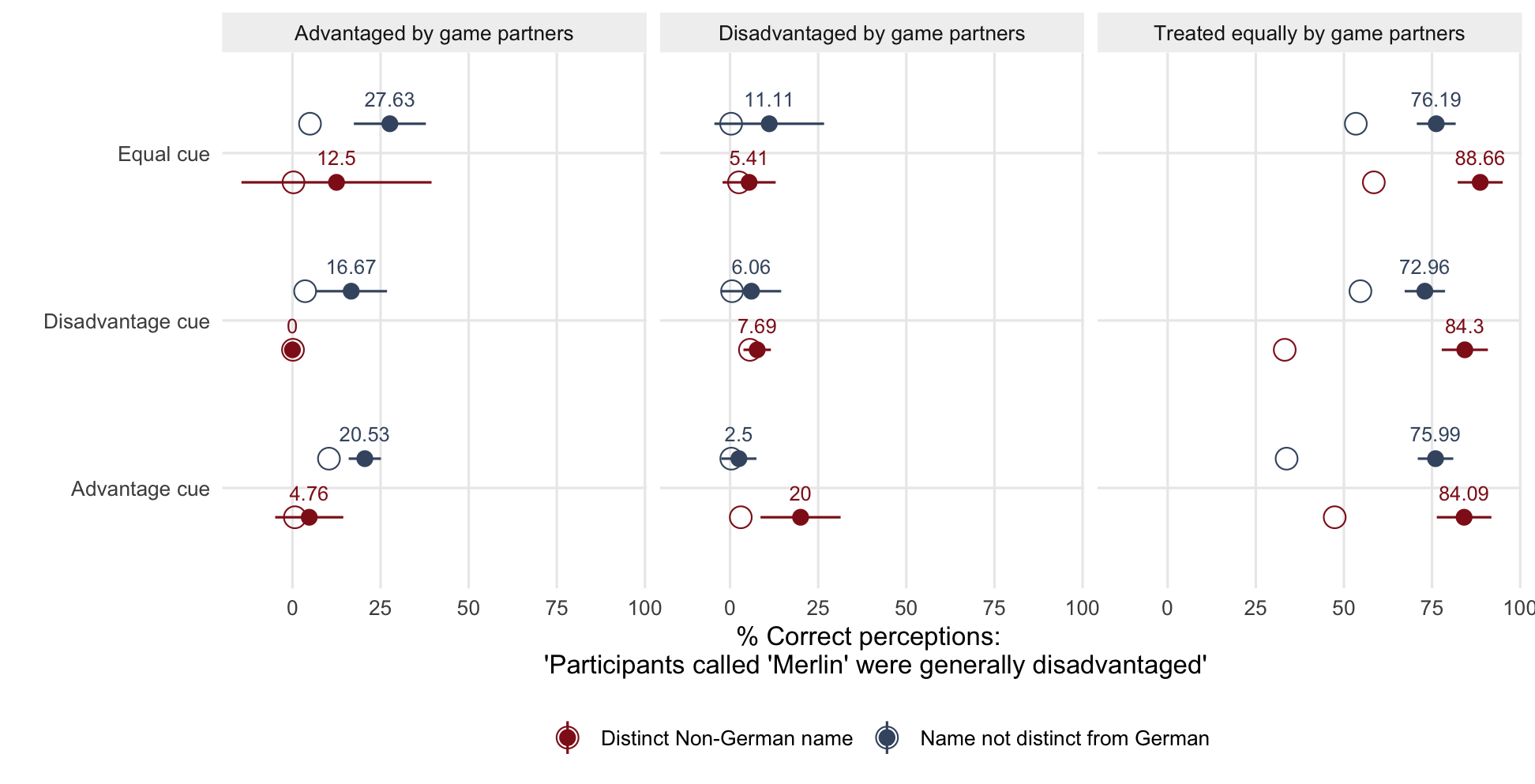
Conclusion for now ...
- On average, people expect no discrimination, but perceive it once ethnicity is made salient.
- ... even under the equal cue!
- Persons with a German-sounding name are perceiving advantage at least as much as those with a non-German name are perceiving disadvantage.
- People generalize their personal experience to equivalent others close to 1:1.
- People seem somewhat better than random at perceiving ethnic discrimination.
- Especially the absence of it!
- (... in the absence of obvious racial slurs etc.)
Conclusion for now ...
- On average, people expect no discrimination, but perceive it once ethnicity is made salient.
- ... even under the equal cue!
- Persons with a German-sounding name are perceiving advantage at least as much as those with a non-German name are perceiving disadvantage.
- People generalize their personal experience to equivalent others close to 1:1.
- People seem somewhat better than random at perceiving ethnic discrimination.
- Especially the absence of it!
- (... in the absence of obvious racial slurs etc.)
Thank you for your attention!
Please contact me,
if you have alternative ideas on how these data can be used and would like to team-up
References
Fundamental Rights, E. U. A. for (2014). Violence against women :an EU wide survey : results at a glance. LU: Publications Office.
Portes, A., R. N. Parker, and J. A. Cobas (1980). "Assimilation or Consciousness". In: Social Forces, pp. 200-224.
Schaeffer, M. and J. Kas (2021). "The Integration Paradox: A Theoretical Synthesis and Meta-Analysis". In: Unpublished manuscript, p. 0.